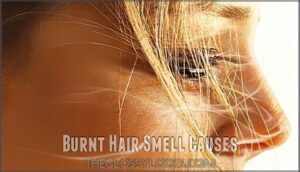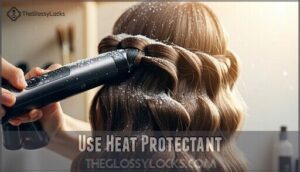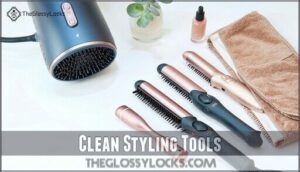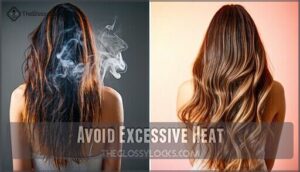This site is supported by our readers. We may earn a commission, at no cost to you, if you purchase through links.

Start by washing your hair with a clarifying shampoo to remove residue. Follow with a deep conditioner to add back moisture.
A quick DIY vinegar rinse (1 part vinegar to 3 parts water) can neutralize odors, though you might smell like a salad for a minute!
Dry shampoo or hair perfume also works wonders for a quick fix.
And remember, prevention’s the real MVP: use heat protectant, clean your styling tools, and avoid cranking up the heat. Your hair will thank you later!
Table Of Contents
- Key Takeaways
- Burnt Hair Smell Causes
- Get Rid of Burnt Hair Smell
- Prevent Burnt Hair Smell
- Remove Burnt Smell Remedies
- Hair Care Maintenance Tips
- Frequently Asked Questions (FAQs)
- How long does fire smell last in hair?
- How do you get rid of burnt smell fast?
- Can diet affect hair’s burnt smell?
- Does hair porosity influence odor retention?
- Can hormonal changes cause hair odors?
- Are there genetic factors in hair scent?
- Can certain water types worsen the smell?
- How does diet impact recovery of burnt hair?
- Can environmental factors contribute to burnt hair smell?
- Are there specific oils effective for odor removal?
- Conclusion
Key Takeaways
- Use a clarifying shampoo to remove buildup and odors, and follow with a deep conditioner to restore moisture.
- Try a DIY vinegar rinse (1 part vinegar to 3 parts water) or baking soda mixed with shampoo to neutralize the burnt smell.
- Keep your styling tools clean to prevent burnt smells caused by residue, and always use a heat protectant before applying heat.
- Opt for lower temperature settings on your tools and avoid styling wet hair to reduce damage and lingering odors.
Burnt Hair Smell Causes
If your hair smells burnt, you’re not alone—it’s usually caused by too much heat or unclean tools.
From skipping heat protectant to styling wet hair, small mistakes can lead to that frustrating smell.
Excessive Heat Damage
Excessive heat can crack your hair’s cuticle like dry pavement in the sun, leaving keratin damaged and oils depleted.
Cracking your hair’s cuticle with excessive heat feels like turning delicate strands into brittle, sunbaked pavement—protect your keratin and natural oils!
This leads to fragile strands and that dreaded burnt hair smell.
Overheating doesn’t just fry hair—it invites silicone buildup too, which locks in damage.
Keep your flat iron under 356°F to avoid turning your locks into a science experiment gone wrong!
Lack of Heat Protectant
Skipping heat protectant is like sunbathing without sunscreen—it’s a recipe for disaster.
Skipping heat protectant leaves your hair defenseless—turning styling sessions into damage central and your strands into a burnt battleground.
Without those magic protectant ingredients, your hair faces direct heat damage, leaving it dry, brittle, and prone to that infamous burnt hair smell.
Application techniques matter too—coat every strand evenly, and different protectant types offer varied product effectiveness, so pick wisely to protect your locks before it’s too late!
Dirty Styling Tools
Sometimes it’s not your hair that’s the problem—it’s your tools.
Residue buildup from hair products scorches on flat iron plates, causing odor transfer and that annoying burnt hair smell.
Hair tools cleaning is a must! Increase cleaning frequency and focus on deep cleaning.
Trust me, a quick wipe saves your strands—and your nose—from the drama.
High Heat Settings
Cranking up your flat iron’s heat setting might feel tempting, but your hair isn’t made of steel.
Using high temperatures that don’t match your hair type fries the cuticle, leading to hair damage and that dreaded burnt hair smell.
Keep heat damage at bay—opt for lower heat settings, invest in a quality tool with temperature control, and style less often to prevent burnt hair smell.
Wet Hair Styling
Styling wet hair with hot tools is like frying soggy fries—disaster waiting to happen.
Wet hair’s weaker structure struggles under heat, causing breakage and that dreaded burnt hair smell.
Skipping proper drying techniques and using wet hair products creates steam, cracking the cuticle.
For healthier scalp health and hairstyle longevity, always wash burnt hair, air dry fully, then style, to prevent burnt hair smell and ensure healthier scalp health.
Get Rid of Burnt Hair Smell
If your hair smells like it took a wrong turn into a campfire, don’t worry—you’re not stuck with the burnt hair smell forever.
There are a few simple steps you can take to banish that odor and feel fresh again. Ready? Let’s fix it:
- Clarifying shampoo: Wash your hair to strip away product buildup and odor.
- DIY vinegar rinse: Mix vinegar with water, rinse through your hair, and say goodbye to lingering smells.
- Masking techniques: Use a scented hair perfume or spray for quick freshness.
- Odor neutralization: Add baking soda to your shampoo for a deeper clean.
- Professional treatments: If all else fails, visit a stylist for a burnt hair treatment—they’ll work wonders!
Consider using dry shampoo for a quick refresh.
Your hair’s rescue plan starts here!
Prevent Burnt Hair Smell
You don’t have to tolerate the dreaded burnt hair smell if you take a few simple steps to avoid it.
With clean tools, the right products, and a little care, you can keep your hair smelling fresh and feeling great every day!
Use Heat Protectant
Using a heat protectant is like giving your hair a superhero cape. Look for protectant ingredients like argan oil or keratin for ultimate hair protection.
Apply it evenly before heat styling, but don’t overdo it—just a light mist. Reapply as needed, especially with heavy styling.
It helps prevent burnt hair smell and reduces long-term heat damage. To find the best option, consider browsing a range of sprays available online for the best hair protection.
Clean Styling Tools
Residue buildup on your hair straightener isn’t just gross—it’s a hair smell culprit waiting to strike.
Grab a damp cloth or safe cleaner and wipe those plates clean after each use. Gunk from products burns, creating that pesky hair odor.
Consider using a specialized cleaning product for best results.
Cleaning frequency? Weekly for heavy use. For all tool types, regular upkeep keeps odors—and frustration—away. Prevention’s way easier!
Avoid Excessive Heat
Keep your heat tools cool—literally. Lower temperatures can save your strands from becoming crispy critters.
Try sectioning hair for faster, even styling without overcooking. Take heat breaks and embrace air drying when you can.
Invest in good-quality tools with adjustable settings to avoid heat damage. Remember to prioritize long-term hair health by using quality products.
Trust me, your nose—and your efforts at hair smell removal—will thank you.
Minimize Product Use
Less is more in the context of styling products.
Too much can lead to product buildup, trapping heat and frying natural oils, which causes that dreaded hair odor.
Lightweight formulas keep your scalp happy and simplify smelly hair solutions.
Skip the overload to avoid hair product residue.
Remember, your scalp craves balance, not a chemistry experiment, and using too much can lead to product buildup.
Maintain Moisturized Hair
Let’s face it—dry hair is like a thirsty plant begging for love!
To keep your hair hydrated and ditch that burnt hair smell:
- Use a leave-in conditioner for moisture retention.
- Try deep conditioning with hydrating ingredients weekly.
- Opt for nourishing product choices formulated for hair hydration.
- Drink plenty of water to boost moisture from the inside.
- Treat yourself to a hair mask monthly!
Remove Burnt Smell Remedies
Getting rid of that burnt hair smell might sound tricky, but it’s easier than you think.
With a few simple remedies, you’ll have your hair smelling fresh and feeling fabulous in no time!
Clarifying Shampoo
Sometimes, your hair just needs a fresh start, especially when dealing with that stubborn burnt smell.
Clarifying shampoo is your go-to hero for hair odor removal. It works deep, stripping away residue that traps the hair smoke smell.
Use it sparingly—once or twice a month is plenty. Sulfate-free options are ideal to prevent color stripping.
Follow with a hydrating conditioner to keep things balanced, and voilà—sweet-smelling hair with a sweet-smelling result!
Dry Shampoo
Switching from clarifying shampoo? Dry shampoo is your secret weapon for hair smoke smell!
Types of dry shampoo, like Living Proof’s, refresh hair while masking odors. Its warm sugar scent leaves no weird grainy feeling.
Apply it before bed to deodorize hair effortlessly. Plus, dry shampoo ingredients absorb oil, making your morning hair routine a breeze.
Total game-changer!
Hair Perfume
Switching from dry shampoo to a hair perfume can save the day when your hair still smells burnt. Choose products with safe ingredients and low alcohol content to prevent dryness.
Follow proper application techniques for even coverage and better scent layering. Look for mists with long-lasting scents.
Say goodbye to unwanted hair odors with these tips:
- Pick alcohol-free options.
- Spray at roots and tips.
- Avoid over-applying.
- Blend with your favorite perfume.
- Try hair fragrances with hydrating formulas.
DIY Vinegar Rinse
A vinegar rinse is your hair’s superhero for smell concerns.
Mix one part vinegar with five parts water, spray it on, and let it sit for 5-10 minutes.
It works wonders to reduce hair odor and neutralize the burnt smell.
Use twice weekly for results, but don’t overdo it.
Bonus: It boosts shine and scalp health!
Baking Soda Treatment
Baking soda is like a superhero for burnt hair smells.
Mix it with water to make a paste, gently apply to damp hair, and rinse. You can also combine baking soda with your shampoo for deep cleansing.
Its odor-neutralization magic tackles stubborn smells.
For post-treatment care, follow up with a hydrating conditioner to avoid dryness. Bam! Problem solved.
Hair Care Maintenance Tips
Taking care of your hair doesn’t have to feel like a full-time job, but it does need some love to stay strong and healthy.
With the right tricks like deep conditioning and regular trims, you can say goodbye to that burnt smell and hello to shiny, happy hair!
Deep Conditioning
Deep conditioning is the superhero your hair needs to remove burnt smell and bounce back from damage.
It restores hydration benefits and protein balance while tackling odors.
Follow these steps:
- Apply a DIY recipe like a yogurt and honey mask.
- Focus on gentle application techniques, ensuring full coverage.
- Let it sit for 20 minutes.
- Rinse thoroughly for silky, odor-free hair!
This process helps to hydrate damaged hair and reduce frizz.
Nourishing Conditioners
When your hair’s struggling, nourishing conditioners can feel like a hug in a bottle.
Look for ones with hydrating properties like argan oil or aloe vera—they repair damage and neutralize hair smell beautifully.
Apply generously, focusing on ends, and use weekly, giving your hair a spa day.
Think of it as giving your hair a spa day! Bonus: silky strands and a fresh, lasting hair fragrance.
Serum Applications
Serums are your hair’s secret weapon.
Hydrating serums like those with argan oil or aloe absorb quickly, boosting shine and locking in moisture.
For neutralizing hair smells, try serums with light hair fragrances.
Apply twice a week for best results, but avoid overdoing it to prevent buildup.
Think of it as perfume for your hair—refreshing and soothing, with serums being a great way to keep your hair hydrating.
Regular Trims
Split ends are like those relentless exes—they keep coming back until you cut them off.
Regular trims are your secret weapon to fix burnt hair and encourage growth.
Trimming removes damaged ends, promotes hair repair, and keeps your style fresh.
Plus, it helps with shape maintenance and damage prevention, leaving your hair looking healthier and happier. Don’t skip it!
Quality Styling Tools
In the context of hair styling tools, quality truly matters.
Using tools with advanced technology like ceramic plates and temperature control minimizes heat damage and protects your strands.
Here’s how to choose wisely:
- Look for tools with damage reduction features.
- Prioritize materials designed for safety, like titanium.
- Clean your tools regularly for performance.
- Replace worn-out curling irons or hair straighteners.
Consider using a ceramic hair straightener for even heat distribution.
Your hair deserves it!
Frequently Asked Questions (FAQs)
How long does fire smell last in hair?
That smoky scent sticks around like an uninvited guest, sometimes lasting days or even weeks.
It depends on your hair’s health and washing routine.
Deep cleansing shampoos can help boot the smell out sooner!
How do you get rid of burnt smell fast?
To ditch that burnt smell fast, wash your hair with a good clarifying shampoo, then follow up with a deep conditioner.
A spritz of hair perfume or a DIY citrus rinse works wonders too!
Can diet affect hair’s burnt smell?
Your diet absolutely matters!
Hair health starts inside you.
Eating oily, processed junk can dry out strands.
Load up on water, nuts, salmon, and spinach instead.
Healthy hair won’t stink—think of it as glow-up fuel!
Does hair porosity influence odor retention?
Yes, hair porosity plays a big role!
High-porosity hair soaks up odor like a sponge, while low-porosity hair resists it.
Think of porosity as your hair’s personality—it decides how much it clings to smells!
Can hormonal changes cause hair odors?
Who knew your hormones could play hide and seek with your hair’s scent?
Hormonal changes can mess with your scalp’s oil production, creating odors.
Keep calm—proper hair care and balance can fix it!
Are there genetic factors in hair scent?
Your hair’s natural scent can be influenced by genetics, like how your scalp produces oils or reacts to bacteria.
Think of it like a family recipe—you didn’t choose it, but it’s uniquely yours!
Can certain water types worsen the smell?
Hard water can make things worse!
It leaves mineral buildup on your hair, trapping odors and amplifying that funky burnt smell.
Switching to filtered water or a clarifying shampoo can save your strands from drama.
How does diet impact recovery of burnt hair?
What you eat feeds your hair too!
A diet packed with proteins, healthy fats, and vitamins like biotin and vitamin E helps repair damage.
Think eggs, nuts, salmon—your hair will thrive, not just survive!
Can environmental factors contribute to burnt hair smell?
Yep, environmental factors can play a role!
Pollution, smoke, or strong odors in the air might cling to your hair.
It’s like your hair’s a sponge, soaking up scents you didn’t sign up for!
Are there specific oils effective for odor removal?
Coconut, argan, and lavender oils work wonders to fight that burnt smell.
They hydrate, add shine, and leave your hair smelling dreamy.
Think of them as the superheroes your stressed locks need—gentle yet effective!
Conclusion
Did you know using a flat iron at 450°F can literally toast your hair? That’s how the dreaded burnt hair smell starts!
But don’t worry—you’ve got this. Whether it’s a clarifying shampoo or a quick vinegar rinse, there are plenty of ways to save the day.
The secret is prevention: keep tools clean, use heat protectant, and lower the heat. Your hair deserves TLC, not BBQ vibes.
So, say goodbye to burnt hair smell and hello to fresh locks!











